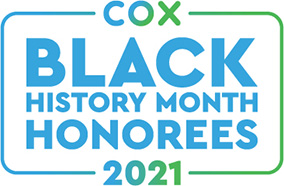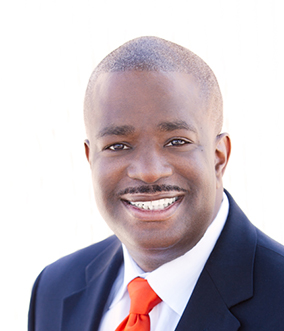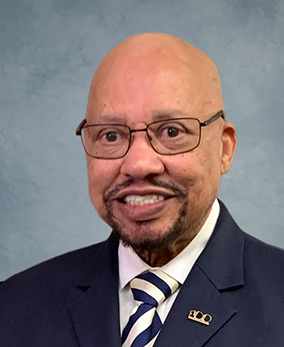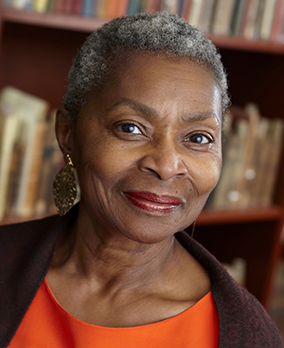Cox Communications honors community leaders
February 15, 2021 by agutting@reviewjournal.com
Filed under Cover Story, Feature
 Cox Communications honors community leaders
Cox Communications honors community leaders
Cox Communications is celebrating Black History Month by honoring four Southern Nevadans who each have a long history of making a difference in our community.
Honorees include Nevada Assemblywoman Daniele Monroe-Moreno; 100 Black Men of America Las Vegas Chapter Founder Larry Mosley; Director of the Oral History Research Center at UNLV Libraries Claytee White; and Cox Media Consultant and Chair of Cox’s Southwest Region Diversity & Inclusion Council Keith Wingate.
“Cox is a company that celebrates inclusion and diversity in our workforce, supplier chain and in our communities,” said Cox VP and Market Leader Michael F. Bolognini. “We’re proud to recognize these individuals, each of whom has made an impact in Southern Nevada over many years.”
Cox has donated $1,000 each to 100 Black Men of Las Vegas, CASA Foundation of Las Vegas, Three Square and the Sawubona Foundation through Nevada Community Foundation in recognition of these honorees. PSAs featuring each will run on Cox channels through February and honorees will be featured on “Doing More” on Cox’s YurView Channel 14/1014.
Las Vegas Black Image Magazine also celebrates the Cox honorees and had the opportunity to conduct interviews with Mosley, White, and Wingate.
LARRY MOSLEY
As the founder and president of the 100 Black Men Las Vegas Chapter, where do you see the organization doing its best work?
The organization is a mentoring organization. There are 101 chapters throughout the United States. I have been a member of four different chapters. I am one of the founding members of the Sacramento and Baltimore chapters. When I came to Las Vegas almost 21 years ago, there was not a chapter here and I personally had been involved with the 100 Black Men national organization for 36 years.
We are a mentoring organization working with young people—and that is our passion and our purpose. We give a lot of scholarships and recently teamed up with Nevada State College with a health and wellness program and we have a collegiate program. I came back to Las Vegas three years ago and I serve for the fourth and final time as the president of the Las Vegas chapter of the 100 Black Men Organization. Within my succession plan, I am happy and proud the Mr. Gentry Richardson has stepped up to the plate and is now the president of the Las Vegas chapter.
Previously, you served as Director of Nevada’s Department of Employment, Training and Rehabilitation. Now, with COVID-19 and so many out of work, what’s your advice to people who are trying to financially hold on by a thread?
I would say to stay diligent — first and foremost. I am really impressed with President Biden and the work he is doing. The Department of Labor is the organization I worked closely with, and I know DETR has a lot of challenges because I was at the helm during the housing crisis. I know getting through the phone lines for the unemployment office is difficult, but you can’t give up. I would also advise people to look at contacting other organizations with support programs to help people during this tough time.
Do you agree that job training is necessary in the changing workforce environment?
Absolutely, that was one of the things Bob Bailey and I really worked passionately toward. As it relates to training you have to be prepared for an opportunity. I used to tell students when I taught at San Jose State: “Better to be prepared for an opportunity and not have it than to have an opportunity and not be prepared for it.”
Why is it so important for our youth to see African-American males in professional positions such as teachers, doctors and CEOs?
It is very impactful. What we say nationally is, “What they see is what they will be.” When you see brothers in the 100 Black Men Organization with their suits on — it’s about what our children see. When children look at our organization, they see doctors, lawyers, policemen, business professionals, and governmental officials. We teach our youth to dream.
How do you feel about your recent Cox Communication’s Honor?
I am just delighted and so humbled by the honor. I am thankful and appreciative of the Cox Communication salute.
CLAYTEE WHITE
Tell us about your position at UNLV and gathering oral history for its library.
This has been an amazing journey and nothing was planned. It was like an open book and it allowed me and UNLV to do some amazing work in the community. We started by interviewing people in the African-American community — that started before there was such a thing called “Oral History Research Center.” Later on, I was a student back in the day getting my master’s degree at UNLV and someone said, “Let’s do an oral history project.” The UNLV history department trained us and we did this project.
Students were assigned topics such as: historic women in Las Vegas, entertainment in Las Vegas, and gaming in Las Vegas. I saw that the topics had all been taken and wondered what I could research. Someone said in the room, “There is a Black community in Las Vegas” — and that time I had only been living in Vegas for a couple of years and I had no idea where the Black community was. At that time, I would go to the local beautician every other week in Vegas because I had a perm on my hair. I asked the beautician, “Where is the Black community?” She pointed at a lady in the waiting area and said, “You need to speak to that lady who is getting in the chair next.”
That lady was Connie Gaye, the daughter of Jimmy and Hazel Gaye. And that started it all. Jimmy and Hazel Gaye gave me an interview and introduced me to some people from Tallulah, Louisiana and we got started. Then someone told me about the Moulin Rouge Hotel — the first integrated hotel and casino in the country; and I started interviewing a woman who was a dancer at the Moulin Rouge Hotel. She told me all about the Moulin Rouge and told me about the wonderful people surrounding the Moulin Rouge.
I collected as many of those interviews as I possibly could — and that woman was Anna Bailey. She then introduced me to Alice Key and all kinds of other people in the Black Las Vegas community. I started learning Las Vegas history and about the Black community. The most fabulous thing about the history is that the more I learned, the more people invited me around the city of Vegas to speak about my historic findings.
Why is it so important to know Black history?
It is very important to know our history because nobody can turn us around. We know about Jim Crow, The Civil Rights Movement and the N.A.A.C.P. that was started in 1909. The more we know, the more armor we have to tell our stories. We don’t have to make up anything. Black people have a great history and we can pass it down to our children. The history becomes more and more vibrant and more important every day.
How many years have you been doing this now?
The UNLV Oral History Research Center started in 2003. But, the early interviews I did in the Las Vegas Black community started in the 1990s. So we go back that far — everything from 2003 to 2016 has been digitized.
Do you find that Black people have benefited more from conflict resolution or advocacy?
I think it is advocacy. Especially here in the Las Vegas Black community. Starting back in the early 1930s. Those activists were just available and were at the right place at the right time. They started organizations in 1932. There was a Democratic club and a Republican club in the Black community. People wanted to know about voting. They wanted to know about history and they started organizations early. When Black people weren’t hired at first on the Hoover Dam construction, they got together and got in touch with the N.A.A.C.P. in the regional office. Local Black residents had them come to Las Vegas to advocate for them. So you had those activists in the community that passed down activism from generation to generation.
How do you feel about your Cox Communications Honor for Black History Month?
I want to thank Cox Communications so much for this great honor.

Keith Wingate, Cox Media Consultant and Chair of Cox’s Southwest Region Diversity & Inclusion Council
KEITH WINGATE
Tell us about your position as Cox Media Consultant and Chair of Cox’s Southwest Region Diversity & Inclusion Council?
My main job is as a media consultant. This means I am a marketer for radio, television and cable services for small and medium size businesses. I have been doing that for about 32 years. In addition to that, for the last four years I have been involved in leadership of the Cox Southwest Region Diversity & Inclusion Council. I was enlightened because it has given me an opportunity to really work with the leadership, as well as facilitate an environment with a strong culture of inclusiveness and equity.
Do you think that the images of African-Americans the media today are helping or hurting Black communities?
That’s a good question. I think we are moving media. The past media had been stagnant when it came to Black people. Especially the displayed image of Black males. I see that moving and the movement happening is giving highlights of Black men and Black women. We are familiar with the Black girls movement over the past couple of years. I think we see a similar movement with Black men also happening. We are getting our place at the table and we’re really making an impact in our communities.
Is there something that Cox Communications is doing to really bridge some of the divides that are going on today?
Yes, our company has pledged dollars toward social justice initiatives across the country. The good thing I like about the company is that they didn’t just take this task on themselves. They asked Cox employees, “What initiatives should we as a company do?” “What organizations should we be a part of?” “What policies do you think we should support in order to support you being an employee here making not only our work environment more sustainable, but also making our communities more impactful?” So the company has done that across the country as well as having a local footprint here in Las Vegas. So, we are very excited about the commitment to diversity and inclusion in our communities.
Are there any programs offered by Cox Communications that help bridge the digital divide?
Yes, our “Connect 2 Compete Program” is a program where a student that qualifies for the free lunch program can fill out an application and actually qualify for reduced priced internet service. So they can be connected for their school work. We have provided this avenue for people in marginalized communities, so they can have some type of equity and be able to really be on par with their peers.
Given the COVID crisis, does Cox Communications offer any special marketing tools for minority owned businesses so they can stay competitive?
Great question. I think the first message I should extend is that I hope everyone is being safe and wearing a mask. I know it’s not fashionably acceptable, but it is necessary and will make it so that we all sustain. We at Cox Communications have a plethora of assets that are available for small business owners. Some of these include on our Cox cable systems that offer advertising opportunities on national networks such as BET, TV-One, VH1, CNN, or MSNBC — we help design strategic initiatives targeting your marketing demographics. Based on behaviors of the consumers who buy from you, we will target your consumers based on behaviors to deliver your business message. Developing campaigns for television, IPhones, or tablets — we have ways to actually deliver your qualified messages to the people who buy from your business.
How did you respond when you heard Cox Communications was honoring you?
I was very surprised because I just go to work every day and try to do my part. To be tapped on the shoulder and to be recognized by your peers in leadership speaks volumes. I am overwhelmed and very humbled by the honor.







